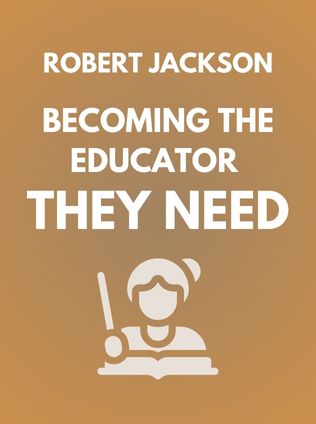
Becoming the Educator They Need
Strategies, Mindsets, and Beliefs for Supporting Male Black and Latino Students
By Robert Jackson
Published 08/2019
About the Author
Robert Jackson is a distinguished educator, speaker, and author who dedicates his work to improving the lives of young Black and Latino males. Drawing from his personal experiences and extensive work in education, Jackson offers profound insights and practical strategies to help educators inspire and engage their students. His book, "Becoming the Educator They Need," serves as a comprehensive guide for teachers and administrators committed to making a meaningful impact in the lives of these students.
Main Idea
"Becoming the Educator They Need: Strategies, Mindsets, and Beliefs for Supporting Male Black and Latino Students" is a focused guide that addresses the unique challenges faced by Black and Latino males. Jackson provides strategies to engage, inspire, and teach these young men effectively. He emphasizes the importance of cultural awareness, relationship building, and creating supportive environments to help these students succeed academically and personally.
Table of Contents
- Introduction
- Cultural Awareness: Understanding the Realities of Life for Black and Latino Males
- Factors that Specifically Affect Male Youths of Color
- Culturally Aware Teaching Practices
- The Six Core Values for Teaching Black and Latino Males
- Core Beliefs and Mindsets of a Culturally Responsive Educator
- Building Strong Relationships with Your Students and Staff
Introduction
Robert Jackson begins by questioning how often educators affirm and support their Black and Latino male students. He stresses the importance of positive affirmations and building strong relationships to help these young men realize their potential. Jackson believes that every successful person can trace their achievements back to a caring adult who believed in them and supported them through challenges.
Cultural Awareness: Understanding the Realities of Life for Black and Latino Males
Jackson highlights the harsh realities faced by many Black and Latino males, including high rates of unemployment, incarceration, and homicide. He argues that educators must understand these realities to effectively support their students. Jackson quotes various statistics to illustrate the systemic challenges these young men face, emphasizing the need for educators to be culturally aware and empathetic.
In America, Black and Latino males are overrepresented in categories typically associated with hardship and defeat. They experience disproportionately high rates of unemployment, incarceration, and homicide, and many of them are so disenfranchised that they are literally “missing” from key census data because they are neither working, in school or college, nor in the criminal justice system. Jackson states:
"One in three Black males and one in six Latino males born in or after the year 2001 will spend time in prison at some point in his life" - The Sentencing Project, 2017
Factors that Specifically Affect Male Youths of Color
Jackson identifies several factors that disproportionately affect Black and Latino males, such as invisibilization, marginalization, pre-criminalization, stereotype threat, colorism, and the myth of color blindness. He explains each factor in detail and provides insights into how they impact students' experiences and outcomes.
Invisibilization
This is the act of seeing a person or situation as invisible, as not important, and without breadth or depth. Jackson argues that society often reacts more strongly to the mistreatment of animals than to the suffering of Black and Latino males.
Marginalization
This occurs when individuals are relegated to a powerless or unimportant position within a society or group due to characteristics like race or ethnicity. Jackson notes that this is prevalent in various systems, including housing, workforce, legal, and education.
Pre-criminalization
Jackson discusses the tendency to perceive Black and Latino males as criminals even when they haven't done anything wrong. This mindset affects how these students are treated by society and within educational settings.
Stereotype Threat
This refers to the fear of affirming a negative stereotype associated with one's race, gender, ethnicity, or cultural group. Jackson explains that this anxiety can negatively impact students' performance and widen the achievement gap.
Colorism
Prejudice or discrimination within an ethnic group against individuals with darker complexions. Jackson highlights that this issue is not only historical but also prevalent in modern society, affecting self-perception and opportunities.
The Myth of Color Blindness
Jackson critiques the notion that treating individuals equally without regard to race can end discrimination. He argues that color blindness ignores the unique experiences and challenges faced by Black and Latino males, ultimately perpetuating inequity.
Culturally Aware Teaching Practices
Jackson argues that many educators have not bridged the gap between themselves and their Black and Latino male students. He offers practical strategies to help teachers connect with their students and create an inclusive and supportive classroom environment.
Developing Cultural Awareness
Understanding the cultural backgrounds of students is crucial. Jackson encourages educators to learn about their students' cultures, traditions, and histories to build stronger connections and foster respect.
Building Trust and Respect
Trust is foundational for any relationship. Jackson advises teachers to demonstrate honesty, consistency, and empathy. Respect is earned by acknowledging students' experiences and treating them with dignity.
Sign up for FREE and get access to 1,400+ books summaries.
You May Also Like
The Subtle Art of Not Giving a F*ck
A Counterintuitive Approach to Living a Good Life
By Mark MansonRich Dad Poor Dad
What the Rich Teach Their Kids About Money - That the Poor and Middle Class Do Not!
By Robert T. KiyosakiHow To Win Friends and Influence People
The All-Time Classic Manual Of People Skills
By Dale CarnegieFreakonomics
A Rogue Economist Explores the Hidden Side of Everything
By Steven D. Levitt and Stephen J. DubnerI Am Malala
The Story of the Girl Who Stood Up for Education and Was Shot by the Taliban
By Malala Yousafzai



















